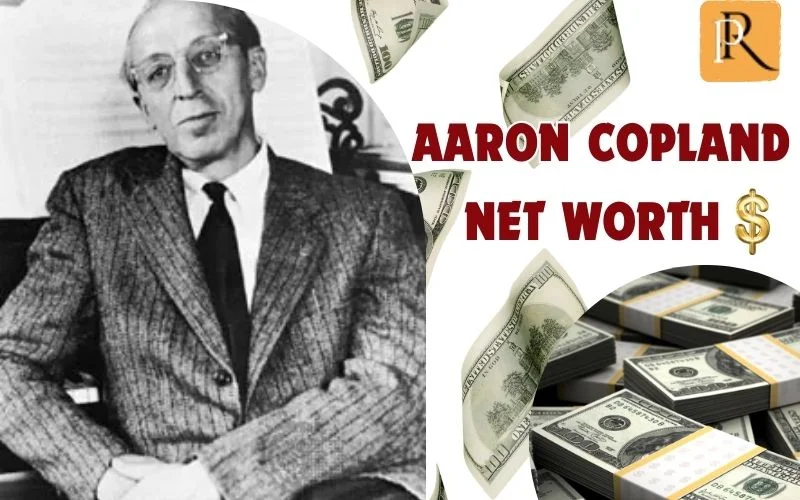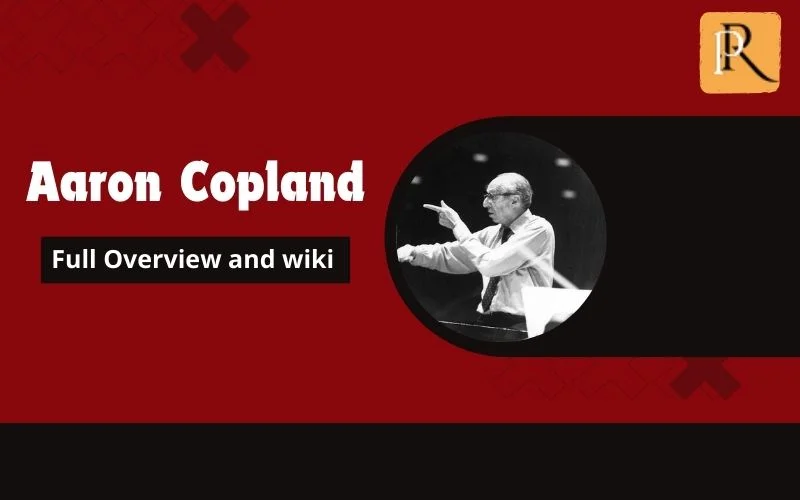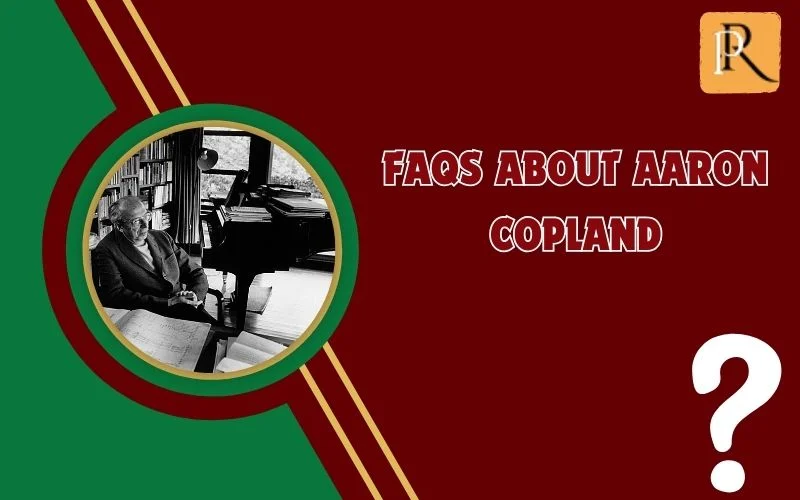Have you ever wondered about the net worth of Aaron Copland, one of the most famous pianists of all time? This American composer born in 1900 left a notable mark not only on piano music but also through his rich range of compositions.
Delve into the fascinating world of Copland’s financial and artistic achievements and see what made him a true icon in classical and contemporary music.
Quick information
| TRUTH | DETAIL |
|---|---|
| Real name | Aaron Copland |
| Popular name | Aaron Copland |
| Sex | male |
| Date of birth | November 14, 1900 |
| Year old | Died December 2, 1990 (90 years old) |
| Parents | Harris Morris Copland, Sarah Mittenthal Copland |
| Siblings | Josephine Copland Bergman, Laurine Copland, Leon Copland, Ralph Copland |
| Place of birth | Brooklyn, New York, USA |
| Nationality | American |
| Nation | Jews in Lithuania |
| Education | Fontainebleau School, Boys’ High School |
| Marital status | Never get married |
| Sexual orientation | do not apply |
| Wife/Wife/husband | do not apply |
| Children | do not apply |
| Dating | do not apply |
| Net value | do not apply |
| Origin of wealth | Composing, teaching, and conducting music |
| Year of operation | do not apply |
| Category | Classical, ballet, orchestra, chamber music |
| Height | do not apply |
What is Aaron Copland’s net worth in 2024?

Aaron Copland’s financial details are largely unrecorded, making his exact net worth difficult to determine, especially considering that his peak was several decades ago to the modern obsession with celebrity net worth.
However, we can explore his financial status through the lens of his contributions and achievements compared to contemporaries such as George Gershwin, Leonard Bernstein and Samuel Barber.
George Gershwin, known for bridging the gap between classical and popular music with works such as Rhapsody in Blue, may have a significant net worth thanks to his popular appeal and output widely including Broadway hits.
Leonard Bernstein, an associate close to Copland, achieved considerable wealth not only from his compositions but also from his extensive conducting career with major orchestras, which raised his income. his entry.
Samuel Barber, another contemporary, while less orthodox, achieved respect and financial stability through his operas and orchestral works.
Aaron Copland Full Overview and Wiki

Aaron Copland is an iconic figure in American music whose compositions reflect the expanding spirit of the American landscape.
Born in 1900 in Brooklyn, New York, to Lithuanian Jewish immigrants, Copland’s early life was steeped in the bustle of a big city, contrasting sharply with the quintessential country themes. America that his music later evoked.
Early life and musical beginnings
From his humble beginnings, Copland was exposed to the rich cultural tapestry that Brooklyn had to offer, raised by a family that, although not musically inclined themselves, supported the pursuit of music. Pursue your art.
His formal musical education began with local teachers before pursuing his seminal studies with Nadia Boulanger in Paris, who profoundly influenced his style and approach to music. .
Nadia Boulanger’s years of study
Boulanger’s guidance in 1920s Paris equipped Copland with the techniques and confidence to pursue a unique sound. His studies abroad also exposed him to a variety of classical and modern influences, which he skillfully combined with American folk themes.
The emergence of Copland’s populist style
Returning to America, Copland’s attachment to the ideal of the ‘American sound’ in classical music became evident in his famous works of the 1930s and 1940s such as Appalachian spring And Exaggeration is for the common man. These works resonated with American audiences, expressing the spirit and landscape of the country.
Contribution to Ballet and Film Music
Copland’s forays into ballet and film music marked important milestones in his career, with scores for Billy the Kid And Rodeo attracted acclaim for its innovative synthesis of American folk music and classical ballet.
His film scores also add a new dimension to his portfolio, enhancing his reputation and demonstrating his versatility.
Head of the Department of American Music
His influence extended beyond composition to teaching and mentoring a generation of musicians and composers. Affectionately known as the ‘Dean of American Music,’ Copland’s legacy includes not only his music but also his efforts to shape the future of American music through education.
The years that followed and turned to serialism
In his later years he experimented with serialism, though never abandoning the accessibility that marked his earlier works.
His career as a conductor began in the 1960s, seeing him conduct orchestras both in the US and abroad until his retirement in the 1970s.
Social media accounts
- Facebook: Not applicable
- Twitter: Not applicable
- Instagram: Not applicable
- YouTube: Not applicable
Frequently asked questions about Aaron Copland

Who is Aaron Copland?
He was an influential American composer, known for his distinctive musical character of American themes in the modern style. He is also a pianist, teacher and conductor.
What are some of Copland’s most famous works?
Some of his notable works include Appalachian Spring, Billy the Kid, Fanfare for the Common Man, and Rodeo.
What style is Copland known for?
He is recognized for creating an accessible musical style that incorporates American folk themes and traditions, which some describe as ‘populist’ or ‘indigenous’ music.
Did he win any major awards?
Yes, he received many awards, including the Pulitzer Prize for Appalachian Spring in 1945, the Academy Award for Best Original Score for The Heiress in 1949, and the Presidential Medal of Freedom in 1964.
How did you contribute to music education?
He was an important figure in the field of music education, teaching at Harvard and The New School, and he authored several books aimed at demystifying music to a wider audience.
What is Copland’s educational background?
He studied music with Nadia Boulanger in Paris, who was one of his major influences.
Does he have any important personal beliefs that influence his work?
His works often reflect his belief in American democracy and the value of the ‘common man’, which is evident in works such as Fanfare for the Common Man.
Is he involved in any notable collaborations?
That’s right, he collaborated with choreographer Martha Graham to create Appalachian Spring, and he was a mentor to Leonard Bernstein.
What influenced Copland’s musical style?
He was influenced by Igor Stravinsky and jazz, as well as Mexican and Cuban music, reflected in works such as El Salón México and Danzón Cubano.
Did you face any political challenges?
During the Red Scare, he was questioned by Congress over alleged communist links, which reflected the tense political climate of the time.
How did he impact American music?
He is credited with creating a distinctively American compositional style incorporating folk and jazz elements that helped shape American classical music in the 20th century.
When did Aaron Copland die?
He died on December 2, 1990, in North Tarrytown (now Sleepy Hollow), New York.
Conclusion
Aaron Copland is not just a master composer; he was a musical visionary whose financial savvy was as astute as his creative genius. His legacy extends far beyond his songs, influencing generations and echoing in the halls of music history.
Discover more about his life and lasting influence at Da Nang Polytechnic.com, where we celebrate legends and explore the stories behind their successes.
Categories: Musician
Source: dut.edu.vn


